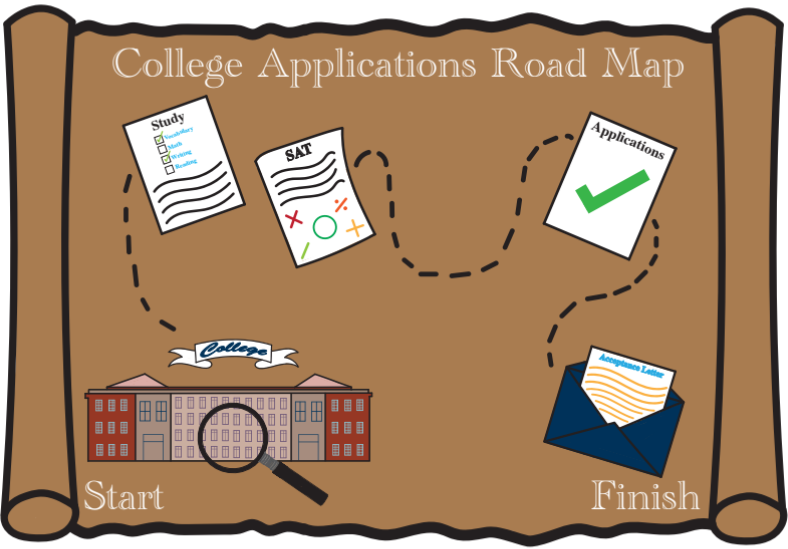Pick Me, Choose Me, Accept Me
Competition in college admissions becomes increasingly cumbersome
October 10, 2022
Applying to university is something that many high school students experience. However, that does not downplay the fact that for many, it is one of the most stressful experiences of their junior and senior years, according to PrepScholar.
On the qualitative side of applying to colleges, students have to select which colleges they are most interested in applying to. Having consulted with hundreds of students, LASA college counselor Vyasar Ganesan, has been able to observe the common concerns upperclassmen come to him with. According to Ganesan, the most common concern is where students should begin to look for application options.
“Most often, I get questions about researching colleges,” Ganesan said. “‘There are 4,000 colleges in this country. Where do I start looking? How do I filter my search results? How do I get past the top 100 schools in America?’ Things like that.”
To properly filter which colleges are worth each individual seniors’ time applying to, LASA college counselor Jamie Kocian recommends applicants develop a good idea of what range of institutions is best for them. The college counselors provide a list of all the schools LASA students have applied to in the past few years and their acceptance rates to help students understand what their target, safety, and reach schools are.
“When I say range, I mean do they have an appropriate number of reaches, targets, and safeties,” Kocian said. “My safeties are schools I know I can get into, my targets are schools that I am pretty sure I am going to get into, and then reach schools that are dream schools. The hope is that they don’t have top heavy reaches, because those are, just like college admissions in general, are super unpredictable. It’s good to have range.”
Not only does figuring out a range help students to filter schools within their academic reach, but it also helps them determine which colleges are the best fit for them, according to Ganesan. While counselors can aid students on their college journey by showing them where LASA alumni with similar academic rankings as them have been admitted to, Ganesan said there is still the fact that each student is different and will have individual wants and needs.
“Applying for college, it’s not a homework assignment,” Ganesan said. “It’s something individual and unique for every single student. No two LASA students will be aligned to the same thing or applying to the same schools. We’re going to have a huge number of people applying for international colleges, Canadian universities, California universities, universities all over the place, so everybody’s needs are different. The best thing I can do is just listen to them, hear what their needs are, and try to guide them as best as I can.”
While it is important to have a realistic range of what colleges one can be accepted into, according to Ganesan, another vital decision in the application process to keep in mind is the decision to apply early. According to Ganesan, applying early guarantees the future mental health of an applicant and makes the application process as a whole much less stressful.
“Applying early makes a big difference.” Ganesan said. “I know there’s a lot of pressure that comes with applying early, but usually your earliest deadline is November 1. The reason we say to apply early is that it cuts down on the waiting time. The hardest part of this process isn’t writing the essays, or taking the SAT, it’s the waiting. It’s sitting and waiting while other students are getting acceptance letters, and you have nothing. That’s the hardest and scariest part because that’s where the mental stuff kicks in. The earlier you can apply, November 1 being that first deadline, the earlier you hear back, which just cuts down on the stress immensely.”
According to Kocian, in addition to considering which colleges to apply to, seniors must also ponder how to go about applying for financial aid. Kocian said she and Ganesan put together a list of many scholarships available to LASA students.
“Some of the main concerns, you can imagine, is money [and] financial aid,” Kocian said. “‘How will I be able to afford college? What scholarships are there? How do I apply for financial aid?’ Other concerns, I think, pertain to the college list itself. ‘Will I be able to get into these schools? Do I have good range in my schools?’”
As found by Berkeley News, although stress is naturally generated to make the mind sharper, if the stress becomes chronic, it can become detrimental. From first-hand experience, former LASA student Alice Sullivan has found that in a culture like LASA’s, maintaining coolheadedness in an academically competitive environment can be extremely difficult for many. However, overtime, Sullivan found that not succumbing to the stress that comes with competition goes a long way in ensuring seniors can succeed in their application process.
“I would say be less competitive with your friends and other LASA people,” Sullivan said. “I feel like LASA can be very competitive, and being overly competitive about college and getting into college brings you more stress than good. I wish I reminded myself more that everyone is out there, working at their own pace, everyone has their own passion. You need to uplift your peers. Even if someone isn’t uplifting you, know that everyone’s doing their own thing. I feel like that’s something that comes with you getting older, but, yes, not being super competitive helps.”


